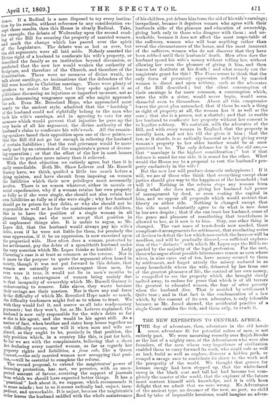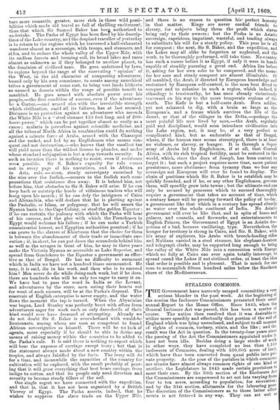THE NEW EXPEDITION TO CENTRAL AFRICA.
THE day of adventure, then, adventure in the old heroic sense, adventure fit for potential rulers of men, is not entirely past. We were mourning recently over Rajah Brooke as the last of a mighty race, of the Adventurers who were also founders, of the men whose very impatience of civilization enabled them to carry forward its work, who could rule as well as lead, build as well as explore, discover a hidden path, or compel a savage race to contribute its share to the work and the prosperity of the world. We thought that groove for human energy had been stopped up, that the white-faced envoy in the black coat and tall hat had become too completely the master of the world, that the explorer of the future must content himself with knowledge, and it is with keen delight that we admit that we were wrong. No Adventurer of the ancient type, no dreamer of the new, no poet, no child fired by tales of impossible heroisms, could imagine an adven tare more romantic, greater, more rich in those wild possibilities which made old travel so full of thrilling excitement, than that which Sir Samuel Baker has beep authorized to 'undertake. The Pasha of Egypt has been fired by his descriptions of the Lake country, and the despised traveller of yesterday is to return to the regions which he traversed a half-exhausted wanderer almost as a sovereign, with troops, and steamers, and rifles, and to reduce the whole valley of the Upper Nile, with its endless forests and teeming soil, its broad lakes and races -almost as unknown as if they belonged to another planet, to the dominion of civilized man. He goes, unfettered by laws, to regions beyond the range of the enervating " opinion" of the West, in the old character of conquering adventurer, bound only by his own conscience, to create among anarchical tribes a government of some sort, to bring vast lands hitherto as unused as deserts within the range of possible benefit to mankind. He goes armed with absolute power over his people,—the first condition of success, even if the adventurer be a Cortez,—and armed also with the irresistible strength which civilization, amid all its failures, has at last secured. Distance is no protection against an adventurer who ascends the White Nile in a "steel steamer 150 feet long, and of 200_horse power," which can be put together almost as easily as a canoe ; malaria is powerless against scientific medicine, and all the tribes of North Africa in combination could do nothing -against a minute force of Arabs, armed with the Chassepot and the rocket, and led by an Englishman who means conquest and not destruction,—who knows that the smallest tax will yield more than the wildest licence to plunder, and under whose standard subjugation is but a step towards security. In such an invasion there is nothing to resist, even if resistance were possible. Sir S. Baker's capacity for rule comes out in every page of his narratives, and in Africa, as in Asia, rule, — stern, steady sovereignty exercised by the wise over the foolish,—secures to the foolish such compensations that resistance dies away. It is behind him, not before him, that obstacles to Sir S. Baker will arise. If he can keep back or outstrip the horde of villainous traders who will hang upon his march ; if he can defy the intriguers of Cairo and Alexandria, who will declare that he is plotting against the Pashalic, or Islam, or polygamy, that he will annex the Nyanza basin to the Cape Colony, or steal the golden Equator ; if ho can restrain the jealousy with which the Pasha will hear of his success, and the glee with which the Frenchmen in Egypt would welcome his failure ; if he can make a Turkish .commissariat honest, and Egyptian authorities punctual ; if he can prove to the slavers of Khartoum that the choice for them is between the abandonment of their trade or immediate execution ; if, in short, he can put down the scoundrels behind him as well as the savages in front of him, he may in three years make the Victoria Nyanza as accessible as Lake Superior, and spread from Gondokoro to the Equator a government as effective as that of Bengal. He has no difficulty to surmount which in India we have not a hundred times surmounted. He may, it is said, die in his work, and then who is to succeed him ? Men never do die while doing such work, but if he does, there are hundreds who will be only too eager to carry it on. We have but to pass the word in India or the Levant, and adventurers by the score, men eating their hearts out for want of such careers, will be at the Pasha's disposal. The reservoir of English enterprise is never empty, and the water flows the moment the tap is turned. When the Abyssinian war began, Lord Stanley was perfectly beset with offers from adventurers eager for work such as only dare-devils of their kind would ever have dreamed of attempting. Already we do not doubt Sir S. Baker is overwhelmed with would-be lieutenants, among whom are men as competent to found African sovereignties as himself. There will be no lack of agents, more especially if he should be able to devise any means of raising money within the countries to be added to the Pasha's rule. It is said there is nothing to export which will bear the expense of carriage except ivory ; but that is the statement always made about a new country within the tropics, and always falsified by the facts. The ivory will do for a time, and meanwhile the capacities of the country for cultivation will be explored, with the result probably of proving that it will grow everything that best bears carriage, from indigo to cotton, and that its people only need direction and security to become steady tillers of the soil.
One single regret we have connected with the expedition, and that is, that it has not been organized by a British Viceroy of Egypt. The Pasha asserts, indeed, that he wishes to suppress the slave trade on the Upper Nile, and there is no reason to question his perfect honesty
in that matter. Kings are never cordial friends to slavery, for subjects bring them the profit which slaves bring only to their owners ; but the Pasha is an Asiatic sovereign, capricious, impatient, wasteful, and tending always to substitute his will for a steady policy. This year he is all for conquest ; the next, Sir S. Baker, and the expedition, and the Lakes may all alike be forgotten or neglected, and the work, to be thoroughly performed, will take time. No country has such a career before it as Egypt, if only it were in hands capable of steadily parsuing a great end. Africa lies before it, asking for her own sake to be conquered, and the means for her sure and steady conquest are almost illimitable. Of all mankind, the Arab, if directed by European knowledge and restrained by European self-control, is the man best fitted to conquer and to colonize in such a region, which indeed, if ethnology is trustworthy, he has once already victoriously traversed on his way to the more temperate regions of the south. The Kafir is but a half-caste Arab. Born soldier, yet not ashamed to dig, with a brain as large as the European's, and a frame which survives the life of the desert, or that of the villager in the Delta,—perhaps the most painful life now lived by man,—the Arab, regularly paid and disciplined, would soon introduce civilization into the Lake region, not, it may be, of a very perfect or complicated kind, but as endurable as that of Bengal, where, if the human race seems stereotyped, there is at least no violence, or slavery, or hanger. It is through a Sepoy army of Arabs led by Englishmen, if at all, that Central Africa, with its rich tropical fertility, must be restored to the world, which, since the days of Joseph, has been content to forget it ; but such a project requires more time, more patient persistence, more abstinence from tyranny than we fear any sovereign not European will ever be found to display. The chain of positions which Sir S. Baker is to establish may be quickly founded, and if he, or any other Englishman, governs them, will speedily grow into towns ; but the ultimate end can only be secured by processes which to succeed thoroughly require a government that takes no account of time, which a century hence will be pressing forward the policy of to-day, a government like that which in a century has spread silently as water over the whole continent of India. No Asiatic government will ever be like that, and in spite of loans and palaces, and councils, and fireworks, and entertainments to English Princes, the Government of Egypt is an Asiatic despotism of a bad, because vacillating, type. Nevertheless, the hunger for territory is strong in Cairo, and Sir. S. Baker, with his army of explorers, his Arabs with breech-loading rifles and Nubians carried in a steel steamer, his elephant-hunters and telegraph clerks, may be supported long enough to bring the valley of the White Nile into a connection with Europe which no folly at Cairo can ever again totally interrupt, to spread round the Lakes if not civilized order, at least the idea that order is possible and is pleasant. That is much for one man to accomplish fifteen hundred miles below the Southern shore of the Mediterranean.



































 Previous page
Previous page